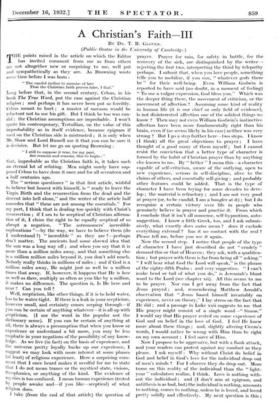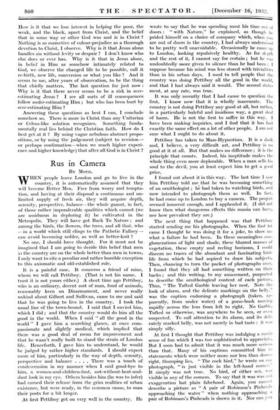A Christian's Faith III
By DR. T. R. GLOVER.
(Public Orator in the University of Cambridge.) THE points raised in the article on which the Editor has invited comment from me as from others arc not altogether new or surprising to me, well put and sympathetically as they are. As Browning wrote some time before I was born - •
" The candid incline to surmise of late That-the Christian.faith proves false, I find."
Long before that, in the second century, Celsus, in his book The True Word, put the case against the Christian religion ; and perhaps it has never been put so forcibly. Celsus meant -to hurt ; a master -of sarcasm would be reluctant not•to use his gift. But I think he too was can- did.; the Christian assumptions are improbable.. I won't quote his contemporary, Tertullian, on the value of this improbability as in itself evidence, because epigram if used on the Christian side is mistrusted ; it is only when Mr. Shaw and Lord Russell use it that you can be sure it is decisive. But let me go on quoting Browning : " I still to suppose it true, for my part,
See reasons and reasons, this to begin:"
that, improbable as the Christian faith is, it takes such an eternal lot of refuting. Men might surely have sup- posed Celsus to have done it once and for all seventeen and a half centuries ago.
The " serious questioner " in that first article, wishful to believe but honest with himself; is " ready to leave the Virgin Birth and the resurrection from the dead and the descent into hell alone," and the writer of the article half concedes that " these are not among the essentials." For my part, I think that is dealing too quickly with Christ's resurrection ; if I am to be sceptical of Christian .affirma, tion of it, I claim the right to be equally sceptical of so abrupt a negation. " The astronomers' incredible explorations "—by the way, we have to believe them (do understand ?) " incredible " as they are ?—perhaps don't matter. The ancients had some shrewd idea that the sun was a long way off ; and when you say that it is snore than a million miles away, and that something else is a million million miles beyond it, you don't add much. Nobody really thinks in millions of miles ; and if God is a million miles away, He might just as well be a million tunes that away. If, however, it happens that He is here as well as there, multiply as often as you like by a million, it makes no difference. The question is, Is lie here and near ? Can you tell ?
. Well, scepticism, like other things, if it is to hold water, has to be water-tight. If there is a leak in your scepticism, however small, and certainty comes seeping through—if you can be certain of anything whatever—it is all up with scepticism. (I use the word in the popular not the dictionary sense). If you can be certain of anything at all, there is always a presumption that when you know or experience or understand a bit more, you may be less emphatic in your negations of the possibility of any know- ledge. As we live (in fact) on the basis of experience, and the universe pretty loyally backs up our experience, I suggest we may look with more interest at some phases (at least) of religious experience. Here a surprising com- ment that I once heard makes it needful for me to state that I do not mean trance or the mystical state, visions, theophanies, or anything of the kind. The evidence of mystics is too confused. I mean human experience (tested by people awake and—if you like—sceptical) of what religion does.
I take (from the end of that article) the question of 'prayer. Prayer for rain, for safety in battle, for the -recovery of the sick, are distinguished by the writer— 'rejecting the first two, interpreting the third by telepathy 'perhaps. I submit that, when you love people, something tells you to mobilize, if you can, " whatever gods there be " for their well-being. Even William Godwin is -reported to have said (no doubt, in • a moment of feeling) To use a vulgar expression, God bless you." Which was -the deeper thing there, the movement of criticism, or the movement of affection ? Assuming some kind of reality in human life (it is our chief or only field of evidence), is not disinterested affection one of the solidest things we -know ? Then may not even William Godwin's instinctive -affection have been more fundamentally right than his brain, even if (as seems likely in his case) neither was very -strong ? But I go a step further here—two steps. I know -(I think) all the great objections to prayer ; I have thought of a good many of them myself ; but I cannot resist the conviction that a better type of character is formed by the habit of Christian prayer than by anything else known to me. By " better " I mean this—a character capable of self-criticism, aware of the outlying, open to new experience, serious in self-discipline, alive to the 'claims of others, and essentially self-giving ; and probably other features could be added. That is the type of -character I have been trying for some decades to deve- lop ; the material is refractory ; and I am not very good at prayer (or, to be candid, I am a bungler at it) ; but I do recognize a certain- victory over life in people who -genuinely believe in prayer and practise it. From which I conclude that it isn't all nonsense, self-hypnotism, auto- suggestion. I know a little Greek, too, and I ask submis- sively, what exactly does autos mean? does it exclude everything external ? has it no contact with the real ? Please tell me, before you use it again.
Now the second step. I notice that people of the type of character I have just described do not " crudely " demand this or that of Heaven ; they ask, with a qualifica- tion ; but prayer with them is far from being all " asking." " I will hear what God the Lord will speak," is the phrase of the eighty-fifth Psalm ; and very suggestive. " I can't make head or tail of what you do," is Jeremiah's blunt word to the Lord (see chapter xii). All this seems to me to be prayer. Nor can I get away from the fact that Jesus prayed ; and, remembering Matthew Arnold's Observation that " Jesus based himself invariably on experience, never on theory," I lay stress on the fact that He did ; and a passage in Luke xxii suggests to me that His prayer might consist of a single word—" Simon." I would say that His prayer rested on some experience of God and on belief in the love of God. I feel He knew more about these things ; and, slightly altering Cicero's words, I would rather be wrong with Him than be right on my own account ; I feel surer of Him.
Now I propose to be aggressive, but with a flank attack, and your readers can protest against my conduct as they please. I ask myself : Why without Christ do belief in God and belief in God's love for the individual drop out of men's minds ? For I observe they do drop out. More turns on this reality of the individual than the " light- year " calculators realize, I think. Love is nothing with- out the individual ; and (I don't aim at epigram, and antithesis is as bad, but) the individual is nothing, amounts to nothing, comes to nothing, unless he is loved, and loved pretty solidly and effectively. My next question is this : How is it that we lose interest in helping the poor, the weak, and the black, apart from Christ, and the belief that in some way or other God was and is in Christ ? Nothing is so corrective of colour-prejudice as a thorough devotion to Christ, I observe. Why is it that Jesus alone handles sin without levity or despair ? I don't know who else does or ever has. Why is it that in Jesus alone, in belief in Him as somehow intimately related to God, we observe the changed life to be possible, call it re-birth, new life, conversion or what you like ? And it seems to me, after years of observation, to be the thing that chiefly matters. The last question for just now : Why is it that there never seems to be a risk in over- estimating Jesus ? I see all sorts of ill consequences follow under-estimating Him ; but who has been hurt by over-estimating Him ?
Answering these questions as best I can, I conclude somehow so. There is more in Christ than any Unitarian or Celsus-like solution recognizes. Something funda- mentally real lies behind the Christian faith. How do I best get at it ? By using vague nebulous abstract propo- sitions, or by using the judgement (subject to revision— or perhaps confirmation—when we reach higher experi- ence and higher knowledge) that after all God is in Christ ?































 Previous page
Previous page